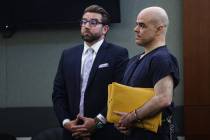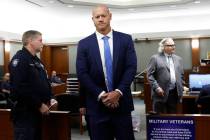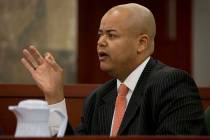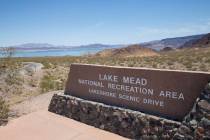Justices hear arguments about legislative money grab
Judging from questions asked by justices Monday, the Nevada Supreme Court might blow a $62 million hole in the state budget.
Justices heard oral arguments in Carson City on whether the Nevada Legislature acted appropriately when it took the $62 million from Southern Nevada's Clean Water Coalition and put it in the state general fund.
Lawmakers passed the law, Assembly Bill 6, in special session in January 2010. The law affects only residents and businesses in Clark County that paid extra fees to fund an ambitious -- and ultimately abandoned -- $850 million wastewater pipeline project.
The water coalition and the M Resort, which paid about $1 million in user fees, argue the money grab constitutes an illegal taking.
But Kevin Powers, an attorney for lawmakers, said the extraordinary financial crisis afflicting the state calls for extraordinary measures.
Attorneys Michael Kealy, for the water coalition, and Jason Woodbury, for M Resort, dismissed that argument. They said the Legislature illegally converted user fees and further violated the state constitution by taking revenues collected by a local government entity for a specific purpose and using it to benefit residents statewide.
No laws would have been violated had the Legislature taken the money and dedicated it to another Clark County entity, Kealy said. The rules were broken only when it was decided the money would go into the general fund with no restrictions on how it could be used.
"The constitution stands supreme to the executive, legislative and judicial branches," Kealy said. "That supremacy stays intact. ... There's no exemption for the Legislature."
Kealy said the taking means the coalition and all who paid special fees have been disproportionately taxed and discriminated against.
M Resort attorney Woodbury said that the money raised was collected from a small subset of residents and that lawmakers forfeited any right to argue the taking was legal because they named the Clean Water Coalition as their target.
The project was dropped when the economy soured and lawmakers saw the money as a one-shot revenue source, but the coalition and one of its largest customers, the M Resort, argued the constitution prohibits lawmakers from converting fees into taxes.
The M Resort wants its $1 million returned. The coalition wants the money returned to those who paid it or used for other improvement projects in Southern Nevada. Before the taking, the coalition deferred making a decision until 2012.
Gov. Brian Sandoval and most current lawmakers want the $62 million for the general fund.
The Legislature stands on the proposition that utilities are under the "sovereign control of the state."
That comment appeared to light a fire under justices.
"So if the Sun Valley Water Company in Reno is accumulating funds to replace infrastructure, the state can come in and sweep those funds?" Justice James Hardesty asked.
"It would be a bad policy decision, perhaps, but it's still a policy decision," Powers said.
"Aren't we asking residents of Clark County to pay for the rest of the state?" Chief Justice Michael Douglas asked.
Powers said that the $62 million was part of "municipal property" and that the state could seize the money legally.
The question of how the revenue source is characterized -- whether as taxes or as fees -- also proved problematic. Hardesty said lawmakers wouldn't be able to seize taxes, but Powers said the coalition did not have the power to tax.
"So what if the M Resort says, 'Wait a minute. CWC charged us money and never had the authority to do that,' " Hardesty said. "Does the state have the right to improvidently take funds when (the coalition) never had a right to take (in the first place?"
Justice Kris Pickering was more pointed: "So the Legislature empowers agencies to collect funds and then can seize those funds as long as they don't call it taxes?"
Later she said, "I'm concerned about limits. Anytime there's budget troubles, we go grab money from local government."
"You have to look at the totality of the circumstances," Powers responded. "They have to be extraordinary."
When the law was passed in January 2010, the projected state shortfall was $800 million. It now hovers around $3 billion, Powers said. "This is an extraordinary problem."
"This is a matter of major import to residents of the state of Nevada," Douglas agreed.
The high court could render an opinion sooner rather than later as the case has been expedited in light of this year's legislative session, which ends in June.
Contact Doug McMurdo at dmcmurdo@reviewjournal.com or 702-224-5512.

















